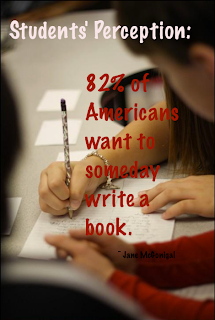I had the good fortune of hearing Jane McGonigal speak. She said two things that spoke to me. Those of you who know me know that I write a lot about empowering students through student-directed learning. Much of my students' learning is done through their writing and publishing with the support of technology to provide them with authentic, collaborative learning opportunities. So where does gaming fit within an already jammed packed day? Is it worth taking a second look?
McGonigal shared the statistic that 99% of boys spend thirteen hours a week and 94% of girls spend eight hours a week gaming. Now that is a startling statistic that, as an educator, made me contemplate..what could I do to harness some of that highly motivated, super-engagement to support my students on their learning continuum? She said that the element that pulls students (gamers) into games is a strong narrative with richly developed, multilayered characters who collaborate to overcome obstacles and solve problems. They make choices and have ensuing consequences. Without that richly developed storyline, gamers wouldn't continue to pursue success within their games, in spite of failing 80% of the time. And whether or not you agree with gaming as a valid mode for education or not, as an educator, these statistic demand some consideration.
The writing teacher in me couldn't help but see this for it was...what is driving these amazing games that are consuming so much of our students' time? It's the story...the writing that went into it when it was being created. I couldn't help but wonder why more writing instruction has not posed student problems to promote this kind of writing. McGonigal showed brain scans of a gamer's brain while engaged in a game. A good portion of the brain was actively engaged. The only other activity that I have seen that lights up the brain more is...wait for it...writing. Writing is what is going to empower our students. Without it, these games won't exist. We will miss out on having rooms full of super-empowered hopeful individuals.
I think that in our enthusiasm for a new tool or strategy sometimes we lose sight of what our students want. All we have to do is ask them. They want to be engaged. They want to be creative. They want to solve real world problems. And, they want to write a book some day. As teachers it is our obligation to give students want they need and what they want our of their education. If getting involved in a game is what is going to help meet the needs of our learners, we need to provide them with those experiences. Those experiences open up a world of possibilities in developing effective, powerful writers and communicators. If students want to write and publish a book, then we need to provide them with those opportunities to write, publish, speak, create and change the world.
Am I gamer? Right now, no. However, that doesn't mean I won't become one. Because I love writing, I thoroughly enjoy an intriguing narrative, I thrive on collaborating with others, and I pursue activities that allow me to be creative, gaming has an appeal to me as it seems to meet all of those needs. And, if I don't try it, how will I meet the needs of large percentage of students who are gamers? As educators, if we lose sight of how students learn and engage, we miss the boat. So, this week, this summer, I encourage all of you to consider how we can grow professionally to best meet the needs of our learners because, after all, it is all about them.
I think that in our enthusiasm for a new tool or strategy sometimes we lose sight of what our students want. All we have to do is ask them. They want to be engaged. They want to be creative. They want to solve real world problems. And, they want to write a book some day. As teachers it is our obligation to give students want they need and what they want our of their education. If getting involved in a game is what is going to help meet the needs of our learners, we need to provide them with those experiences. Those experiences open up a world of possibilities in developing effective, powerful writers and communicators. If students want to write and publish a book, then we need to provide them with those opportunities to write, publish, speak, create and change the world.
Am I gamer? Right now, no. However, that doesn't mean I won't become one. Because I love writing, I thoroughly enjoy an intriguing narrative, I thrive on collaborating with others, and I pursue activities that allow me to be creative, gaming has an appeal to me as it seems to meet all of those needs. And, if I don't try it, how will I meet the needs of large percentage of students who are gamers? As educators, if we lose sight of how students learn and engage, we miss the boat. So, this week, this summer, I encourage all of you to consider how we can grow professionally to best meet the needs of our learners because, after all, it is all about them.


No comments:
Post a Comment